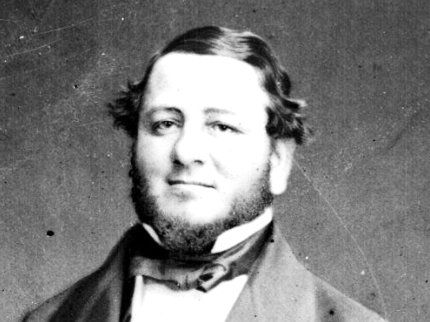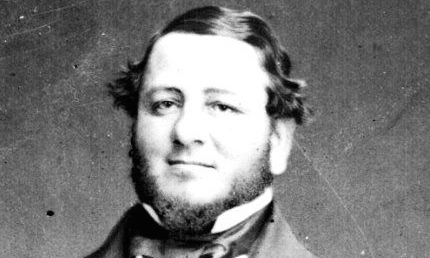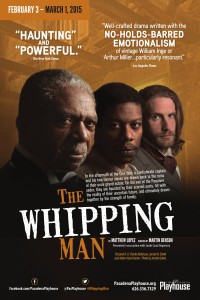
Judah P. Benjamin, Jewish Confederate and slave owner. (National Park Service)
The Whipping Man, which just closed at the Pasadena Playhouse after a month long run, tells the story of a Jewish Confederate captain who staggers back to his family’s crumbling mansion in Richmond, Virginia in April 1865, just days after the Civil War has ended. The badly wounded soldier (Adam Haas Hunter) is reunited with two of his newly emancipated slaves (Charlie Robinson and Jarrod M. Smith), who take drastic measures to save his life. In Act II the men come together to celebrate the Passover Seder, with pilfered wine and hardtack for matzah, but the joyous mood quickly turns tense as uncomfortable truths are revealed.
The play, which was written by Matthew Lopez (who is neither black nor Jewish), has been staged across the country and won numerous awards. It is probably the only play with black Jewish characters. Naturally, I was very eager to see it.
During intermission of a recent performance, I flipped through the playbill and came across a short essay titled “Finding Common Ground between the Hebrew and African Slave Experience.” In the essay Playhouse staffer Kareem Cervantes discusses the significance of “Go Down, Moses,” the spiritual that is traditionally sung at the Seder and that actor Charlie Robinson performs in the play with gusto. Cervantes writes that the song was composed communally and sung by slaves “who felt a connection between their plight and that of the Hebrew slaves in Egypt.” That is certainly true.
Then he writes: “African slaves in the South would have learned the history of the Hebrew slave experience through Jewish slave owners or the slaves of Jewish slave owners.”
This statement is misleading. The number of slaves who had Jewish owners was relatively small because the number of Jews in the South was small—approximately 25,000 in 1860. Estimates of how many of those Jews owned slaves vary, but scholars agree that Jews tended to be “smallholders” who lived in cities and towns, not planters who owned about 90% of the slaves. Some 3,000 Jews fought for the Confederacy in the Civil War. Richard N. Rosen, in his book The Jewish Confederates, writes that “the great majority of Jewish soldiers were relatively poor clerks, peddlers, artisans, tailors, shopkeepers, and petty merchants who not only never owned a slave but had no realistic hope or ambition to do so.”
So most slaves would have learned about the Israelites’ captivity in Egypt not from Jews but from Christians, who were in the majority and owned the most slaves, and from other slaves who had already been exposed to the Bible.
During the Great Awakening of the 1740s and 50s, Baptist and Methodist preachers led a religious revival in the South that spread through both white and black populations. At first masters opposed the conversion of their slaves, fearing they would rebel if they began to think of themselves as equal to whites before God; later, many masters imposed Christianity on their slaves as a form of social control, emphasizing the values of obedience and humility. In Slave Religion: The ‘Invisible Institution’ in the Antebellum South, historian Albert J. Raboteau notes that “not all slaves were Christian, nor were all those who accepted Christianity members of a church, but the doctrines, symbols, and vision of life preached by Christianity were familiar to most.”
The slaves’ introduction to the Bible usually came by way of family members and other slaves, especially elders and slave preachers. Raboteau explains that widespread illiteracy did not prevent the slaves from acquiring religious knowledge because Bible stories were incorporated into their oral tradition. He writes: “Unable to read the Bible for themselves and skeptical of their masters’ interpretation of it, most slaves learned the message of the Christian gospel and translated it into songs in terms of their own experience.” Thus “Go Down, Moses” and other spirituals were born.
(There is at least one other school of thought about how slaves came to know and sing about Biblical figures like Moses and places like the Jordan River. This school of thought says that the slaves were direct descendants of the Biblical Israelites, who migrated to West Africa after the destruction of the Temple in Jerusalem in 70 C.E. and then were kidnapped and shipped to the New World as slaves. Modern-day Hebrew Israelites are the main proponents of this theory, though historians are skeptical.)
To be perfectly clear, I don’t deny that Southern Jews owned slaves. It is a fact that some did, just as it is a fact that some free blacks owned slaves. (Edward P. Jones explored this phenomenon in his celebrated novel The Known World, which I highly recommend.) According to Rosen, “The Jews of the South lived in a slaveholding society, and they accepted the institution as part of everyday life.” It’s also very likely that some slaves adopted the Judaism of their owners and celebrated the holidays with them—or at least observed the celebrations from behind a serving tray.
The issue of Jewish involvement in the Atlantic slave trade is a touchy subject for many reasons, including the Jews’ own history of enslavement. In the 1990s the Nation of Islam published a book called The Secret Relationship Between Blacks and Jews that accused Jews of orchestrating the slave trade and of using slave labor “disproportionately more than any other ethnic or religious group.” The Simon Wiesenthal Center refuted the NOI’s paranoid lies in a book of its own. Henry Louis Gates, Jr., my former professor at Harvard, called The Secret Relationship “one of the most sophisticated instances of hate literature yet compiled.” (NOI leader Louis Farrakhan is no friend of the Jews, as Gates himself has helped us to understand.)
The Pasadena Playhouse playbill is obviously not a scholarly publication; the artist’s representation of “Hebrews slaves in ancient Egypt,” presented on page 2 alongside historical photographs of Harriet Tubman and Judah P. Benjamin (the most prominent Jewish Confederate and slave owner, seen above), is proof enough of this. While I don’t think that Cervantes intended to be provocative in writing that slaves would have learned about the Exodus from Jewish slave owners without mentioning any Christian influence, I hope that this post sets the record straight and that the Playhouse will be more careful in the future when addressing sensitive issues like this one.
As for the play, I was very moved by the actors’ nuanced performances (as well as by their excellent Hebrew pronunciation). To the playwright’s credit, The Whipping Man does not politicize the ownership of slaves by Jews. Instead, it cuts quite literally to the human core of slavery, forcing us all to look at the scars with our eyes wide open.





